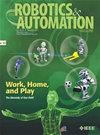奔向源头:机器人代码库的有效可复制性
IF 5.4
3区 计算机科学
Q1 AUTOMATION & CONTROL SYSTEMS
引用次数: 0
摘要
近年来,机器人学界积极拥抱开放范式,研究文章通常都会加入软件源代码库,使内容更加丰富。然而,这些代码的可重现性并不简单,而且随着软件的发展可能会变得越来越困难。因此,不仅需要提供源代码,还需要提供包含所有必要依赖库的可执行版本。本文介绍了一种基于软件容器的解决方案,它具有一些独特的优势。首先,可执行程序包是从源代码的最后一个版本自动生成的;其次,它存档在托管代码库的同一个云服务中;第三,它与研究代码的开发工作流程无缝集成;最后,它不消耗研究人员的任何本地计算资源。然后,其他用户可以下载和运行可执行代码,唯一的要求是安装运行容器的特定软件。本文介绍了完整的工作流程,然后将其应用于机器人会议上发表的文章源代码库的一些示例。本文章由计算机程序翻译,如有差异,请以英文原文为准。
Run to the Source: The Effective Reproducibility of Robotics Code Repositories
In recent years the robotics community has actively embraced the open paradigm, and research articles are commonly enriched with the inclusion of a source code repository of software. However, the reproducibility of such code is not straightforward, and it may become increasingly difficult with the evolution of software. There is a need for providing not only the source code but also an executable version with all of the necessary library dependencies. A solution based on software containers is presented in this article, with some unique advantages. First, the executable package is automatically generated from the last version of the source code; second, it is archived in the same cloud service that hosts the code repository; third, it integrates seamlessly with the development workflow of the research code; finally, it does not consume any local computing resources from the researcher. The executable code can then be downloaded and run by other users, with the only requirement being installing a specific software for running containers. This article presents the complete workflow, which is then applied to some illustrative examples of source code repositories of articles published at robotics conferences.
求助全文
通过发布文献求助,成功后即可免费获取论文全文。
去求助
来源期刊

IEEE Robotics & Automation Magazine
工程技术-机器人学
CiteScore
8.80
自引率
1.80%
发文量
100
审稿时长
>12 weeks
期刊介绍:
IEEE Robotics & Automation Magazine is a unique technology publication which is peer-reviewed, readable and substantive. The Magazine is a forum for articles which fall between the academic and theoretical orientation of scholarly journals and vendor sponsored trade publications. IEEE Transactions on Robotics and IEEE Transactions on Automation Science and Engineering publish advances in theory and experiment that underpin the science of robotics and automation. The Magazine complements these publications and seeks to present new scientific results to the practicing engineer through a focus on working systems and emphasizing creative solutions to real-world problems and highlighting implementation details. The Magazine publishes regular technical articles that undergo a peer review process overseen by the Magazine''s associate editors; special issues on important and emerging topics in which all articles are fully reviewed but managed by guest editors; tutorial articles written by leading experts in their field; and regular columns on topics including education, industry news, IEEE RAS news, technical and regional activity and a calendar of events.
 求助内容:
求助内容: 应助结果提醒方式:
应助结果提醒方式:


